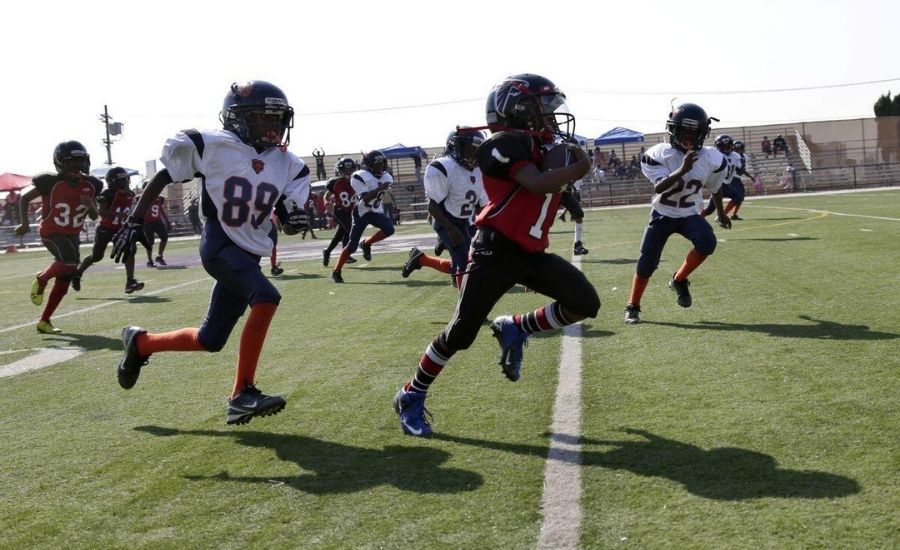Youth football is more than just running and kicking. It’s about teamwork, learning, and having fun with friends. Whether on a small field or in a big stadium, youth football teaches kids important skills for life.
Playing youth football helps kids grow strong, both in body and mind. It builds confidence, teaches discipline, and creates lasting friendships. For many kids, youth football is not just a sport—it’s an adventure full of exciting lessons.
What is Youth Football and Why is it Important?
Youth football is a fun and exciting sport that kids all over the world enjoy. It involves playing football, a game where players try to score points by kicking a ball into the other team’s goal. The main goal of youth football is to have fun while learning teamwork and sportsmanship.
It’s important because it helps kids grow both physically and mentally. Kids develop strength, speed, and coordination while playing the game. Besides fitness, youth football also teaches important life skills like responsibility, how to listen to coaches, and how to work with others.
Football is not just about winning games but about learning how to handle both success and failure. Playing on a youth football team can boost confidence, teach discipline, and improve social skills. These lessons stay with children as they grow up and can help them in many areas of life.
Top Benefits of Playing Youth Football

Here are the top benefits of playing youth football:
- Physical Fitness: Youth football helps kids stay active, improving strength, speed, and coordination. It encourages regular exercise, which is important for maintaining a healthy body.
- Teamwork: Football teaches kids how to work as a team. They learn that every player has a role to play, and when everyone works together, the team is stronger.
- Improved Social Skills: Playing football allows kids to make new friends and learn how to communicate with teammates. They also gain confidence in social settings.
- Discipline and Responsibility: Football teaches kids the importance of discipline, both in practice and during games. They learn to follow rules, respect coaches, and take responsibility for their actions.
- Problem-Solving and Quick Thinking: On the field, kids must think quickly and make decisions under pressure. This helps develop critical thinking and problem-solving skills.
- Boosts Confidence: As kids improve their skills and succeed in the game, their self-esteem grows. Football encourages them to believe in themselves and their abilities.
- Learning How to Handle Wins and Losses: Football helps kids deal with both victory and defeat. They learn to celebrate wins with humility and handle losses with resilience.
- Leadership Skills: Through the sport, kids learn to take on leadership roles. They may captain the team or encourage others, helping them develop strong leadership qualities.
- Mental Toughness: Football teaches perseverance and mental strength. Kids learn how to stay focused, overcome challenges, and keep going even when things get tough.
- Creates Healthy Habits: Youth football encourages kids to develop good habits, such as regular exercise, healthy eating, and getting enough sleep, which they can carry into adulthood.
How Youth Football Builds Teamwork and Friendships
Youth football is a team sport, meaning kids have to work together. They learn that to succeed, everyone must play their part. Football builds teamwork by helping kids understand the value of supporting one another. Every player is important, and when they work together, they can achieve great things.
This teamwork also leads to forming strong friendships. Playing on a youth football team helps kids make new friends who share similar interests. These friendships can last for years, even beyond the football field. Being part of a team means kids always have someone to cheer them on.
Through youth football, kids learn how to communicate and cooperate with others. Whether on the field or off, these skills are useful in school, at home, and later in life. Football teaches kids that success is often the result of great teamwork and helping each other.
Tips for Parents Supporting Youth Football Players
Here are some tips for parents supporting youth football players:
- Encourage and Stay Positive: Always cheer for your child, whether they win or lose. Positive encouragement boosts their confidence and keeps them motivated to do their best.
- Focus on Fun and Learning: Remind your child that football is about having fun and learning, not just winning. Emphasize the importance of improving skills, teamwork, and enjoying the game.
- Provide the Right Gear: Make sure your child has proper football equipment, including a helmet, pads, and appropriate shoes. Good equipment helps them stay safe and comfortable during the game.
- Be Involved in Practices and Games: Show interest by attending games and practices when possible. Your support means a lot to your child and helps create a strong connection between home and the field.
- Teach Good Sportsmanship: Encourage your child to respect the coaches, teammates, and opponents. Teach them to shake hands after games, win or lose, and to always show kindness and respect on the field.
- Help with Time Management: Balance football with other responsibilities like schoolwork and rest. Encourage your child to stay organized and manage their time well, so they can enjoy football without stress.
- Provide Healthy Meals and Hydration: Fuel your child with nutritious food and make sure they stay hydrated, especially before and after games or practices. A healthy body supports better performance on the field.
- Be Patient with Progress: Understand that improvement takes time. Celebrate small victories and encourage your child to keep practicing, even if they don’t master a skill right away.
- Teach How to Handle Setbacks: If your child faces a tough loss or mistake, help them see it as an opportunity to learn. Support them in finding ways to improve, rather than focusing on disappointment.
- Promote Rest and Recovery: Football can be intense, so encourage your child to rest and recover between games. Proper sleep and downtime are essential for staying healthy and avoiding injury.
By following these tips, parents can help their child enjoy their youth football experience and develop both on and off the field.
Essential Skills Kids Learn in Youth Football

Youth football helps kids develop many important skills that go beyond just kicking a ball. First, kids learn to improve their coordination. Running, passing, and controlling the ball all require good coordination, which they develop through practice.
Football also teaches kids about focus and concentration. When playing, kids must focus on the ball, the players around them, and the game plan. This helps improve their ability to concentrate in other activities, like schoolwork.
Additionally, youth football teaches kids decision-making skills. Players have to make quick decisions during the game, like when to pass or when to shoot. These skills can help kids in other areas of life, such as problem-solving and critical thinking.
How to Choose the Right Youth Football Program
Choosing the right youth football program is important for your child’s development. Start by looking for a program that has experienced coaches who understand how to teach kids. Coaches should focus on fun, safety, and learning, not just winning games.
Next, check if the program has a strong focus on teamwork and sportsmanship. A good youth football program will encourage kids to be supportive of each other, respect the rules, and show kindness to their teammates and opponents.
Finally, make sure the program fits your child’s age and skill level. Some programs focus on teaching beginners, while others might be more competitive. Picking the right program ensures that your child is challenged and enjoys their experience in youth football.
Do You Know: Octordle-hint
The Role of Coaches in Youth Football Success
Coaches play a huge role in the success of youth football players. They teach players the rules, the skills, and the strategies of the game. A good coach is also a mentor who encourages kids to do their best while making sure they have fun.
Coaches also help kids learn important lessons about life. They teach sportsmanship, responsibility, and how to handle wins and losses. A great coach will inspire kids to stay positive, work hard, and be respectful to everyone on and off the field.
In addition to teaching the game, coaches help create a supportive and safe environment for all players. They make sure the kids are comfortable and feel confident in their abilities. Youth football coaches are key in making the experience enjoyable and rewarding for kids.
Staying Safe While Playing Youth Football

Safety is a top priority when playing youth football. First, make sure your child is wearing the right equipment. Helmets, pads, and mouthguards protect against injuries and help keep players safe during contact.
Another way to stay safe is by practicing proper techniques. Coaches should teach kids how to tackle, block, and move in ways that reduce the risk of injury. For example, using the right posture when running or tackling can help avoid collisions.
It’s also important to pay attention to the weather and field conditions. Playing in extreme heat can be dangerous, so kids should take breaks and drink plenty of water. Keeping an eye on these factors ensures that kids stay safe while having fun in youth football.
Fun Drills and Practices for Youth Football Teams
There are many fun drills that can help kids improve their skills in youth football. One popular drill is the “passing drill,” where kids practice passing the ball to each other while running. This helps improve accuracy and teamwork.
Another fun drill is the “flag football” game, where players practice their defense skills by trying to grab flags from their opponents instead of tackling them. This drill makes kids think fast and helps them understand defensive strategies.
Youth football practices should also include games and challenges that keep kids engaged and excited to learn. Making practice fun and interactive helps kids stay motivated and improve faster while enjoying the sport.
How Youth Football Inspires Confidence in Kids
Youth football is a great way to build confidence. When kids practice and get better at their skills, they start to believe in themselves. The more they succeed, the more they feel proud of their abilities.
Football also helps kids become more confident when facing challenges. Whether they are working on a tricky move or playing in a tough game, they learn that they can overcome obstacles with practice and determination.
Being part of a team also boosts kids’ self-esteem. They feel valued by their teammates and learn to trust in their abilities. The support of a team can make a huge difference in helping kids grow into confident individuals.
Youth Football: A Pathway to a Healthier Lifestyle

Playing youth football helps kids lead a healthier lifestyle. The physical activity involved in football improves strength, speed, and flexibility. These fitness benefits can make kids feel stronger and more energetic.
Youth football also encourages kids to stay active outside of practice. They learn that exercise is fun, and they carry these healthy habits into their daily lives. This can lead to better health as they grow older and reduce the chances of becoming overweight or inactive.
A healthy lifestyle isn’t just about physical fitness, though. Football teaches kids the importance of eating right, getting enough sleep, and taking care of their bodies. These habits help them stay strong and healthy in both body and mind.
The Joy and Challenges of Youth Football Games
Youth football games are full of excitement and challenges. The thrill of playing in a real game makes kids feel like they are part of something special. Whether they win or lose, kids learn valuable lessons from every game.
One of the challenges in youth football is learning how to deal with both success and failure. When kids win, they learn to celebrate with humility. When they lose, they learn how to bounce back and try again. These experiences teach kids resilience and how to handle tough situations.
Overall, youth football games are a fun way for kids to grow, learn, and enjoy the sport. The joy of playing with friends, the challenge of improving, and the lessons learned from every game make youth football a rewarding experience.
Conclusion
Playing youth football is a fantastic way for kids to stay active, learn new skills, and make friends. It helps them build confidence, teamwork, and discipline, which are valuable both on and off the field. Whether they’re running for a touchdown or cheering on their teammates, every experience in youth football helps them grow.
As parents, your support and encouragement can make all the difference in your child’s football journey. With the right attitude, positive reinforcement, and a focus on fun, youth football can be a wonderful and rewarding experience for your child. Let them enjoy the game while learning life lessons that will last forever.
Read More: Skyward-alpine
FAQs
Q: What age is good to start playing youth football?
A: Kids can start playing youth football around age 5 or 6, depending on the league.
Q: How can I help my child improve in football?
A: Encourage practice, focus on teamwork, and make sure they stay active outside of practice.
Q: Is football safe for kids?
A: Yes, football is safe for kids when they wear the right gear and follow safety rules.
Q: How often should my child practice football?
A: Practicing 2-3 times a week is usually enough for kids, along with game days.
Q: Can youth football help with social skills?
A: Yes, football helps kids make new friends and learn how to communicate and work as a team.
Q: How do I know if my child is ready for football?
A: If they enjoy playing sports and are excited to learn new skills, they’re probably ready.
Q: What should my child eat before a football game?
A: A light meal with healthy carbs and protein, like a banana and peanut butter, is perfect before a game.
